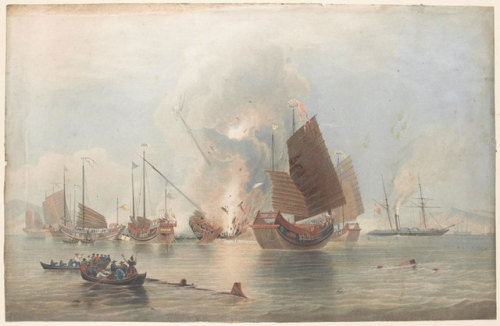Opium Warspaintings:A Fort on the Canton River, 1st China War, Oil on board, Chinese School, 1839 -
Opium Warspaintings:A Fort on the Canton River, 1st China War, Oil on board, Chinese School, 1839 - 1842©A Fort on the Canton River, 1st China War, Oil on board, Chinese School, 1840©.‘The taking of the Island of Chusan by the British, 5th July 1840’ Lithograph by Lieutenant-Colonel Sir Harry Darell (1814-1853)'The East India Company’s iron steamship Nemesis, Lieutenant W H Hall RN, Commander, with boats of Sulphur, Calliope, Larne and Starling destroying Chinese war junks in Anson’s Bay, January 7th 1841’, Coloured aquatint by and after E Duncan, 1843.'Joss House, Chapoo [sic], Death of Colonel Tomlinson’, 1842, Coloured engraving by T A Prior after T Allom from a sketch by Captain Stoddart,'Storming of the forts and entrenchments of Chuepee [sic] on 7th January 1841′, Coloured lithograph by Dickenson, after F J White, published by Dickenson and Son, 1841 ©.The 18th (Royal Irish) Regiment of Foot at the Storming of the Fortress of Amoy, 26 August 1841, Coloured lithograph, by J H Lynch after M A Hayes. Published by William Spooner, London, 1841 ©.British forces fought a war on behalf of drug traffickers. Their victory opened up the lucrative China trade to British merchants. This was all done with the full blessing of the British government.The roots of the Opium War (or First China War) lay in a trade dispute between the British and the Chinese Qing Dynasty. By the start of the 19th century, the trade in Chinese goods such as tea, silks and porcelain was extremely lucrative for British merchants. The problem was that the Chinese would not buy British products in return. They would only sell their goods in exchange for silver, and as a result large amounts of silver were leaving Britain.In order to stop this, the East India Company and other British merchants began to smuggle Indian opium into China illegally, for which they demanded payment in silver. This was then used to buy tea and other goods. By 1839, opium sales to China paid for the entire tea trade. The war resulted in the Treaty of Tientsin (26 June 1858), which imposed on the Chinese the obligation to pay reparations for the expenses of the recent war, a second group of ten more ports being opened to European commerce, the legalization of the opium trade, and foreign traders and missionaries gained rights to travel within China. -- source link
Tumblr Blog : yeoldegunporn.tumblr.com
#opium war#england#china#history






